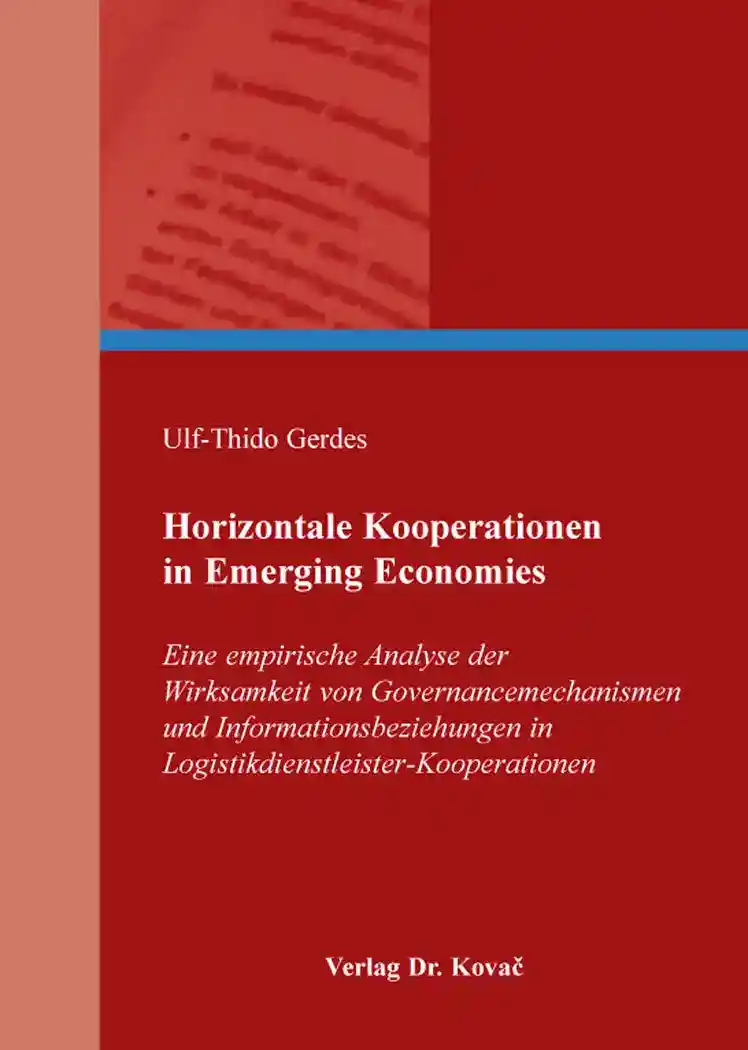Ulf-Thido GerdesHorizontale Kooperationen in Emerging Economies
Eine empirische Analyse der Wirksamkeit von Governancemechanismen und Informationsbeziehungen in Logistikdienstleister-Kooperationen
Logistik-Management in Forschung und Praxis, volume 59
Hamburg 2017, 218 pages
ISBN 978-3-8300-8964-3 (print) |ISBN 978-3-339-08964-9 (eBook)
About this book deutschenglish
In order to survive in international competition, more and more logistics service providers are engaging in horizontal cooperations. However, horizontal cooperations, as compared to vertical collaborations, are more difficult to control. The complexity in the governance of horizontal cooperations is reflected in the high rate of failed cooperations that is up to 70%. Therefore, it is particularly important for horizontal cooperations to identify appropriate governance mechanisms.
Especially in Emerging Economies are many small and medium-sized logistics service providers engaging in horizontal cooperation in order to offer their logistics services internationally and mitigate the inherent risks in their home markets. Companies in emerging economies are frequently exposed to an uncertain legal framework, which changes frequently and makes the enforcement of legal claims difficult. Due to the environmental uncertainty for businesses in emerging economies, the governance mechanisms may significantly differ from those mechanisms in industrialized countries. Accordingly, the identification and application of appropriate governance mechanisms is of utmost importance in order to successful manage horizontal cooperations
In this study the effectiveness of different governance mechanisms for horizontal cooperations working under the environmental uncertainty of Emerging Economies is analyzed. First, the relevant theories are identified, and then the structural equation method used in this book is presented in detail. After the identification of relevant governance mechanisms by means of participant observation, the effectiveness of the identified mechanisms is explored empirically. The governance mechanisms are clustered into transactional and relational mechanisms and analyzed for their individual and collective effectiveness in governing horizontal cooperations. The results indicate that the identified governance mechanisms achieve their full effectiveness only under environmental uncertainty and are not suitably to govern horizontal cooperations in stable environmental conditions. Thus, the book provides valuable input for decision-makers from practice and politics and also provides a basis for further research in the field of horizontal cooperations in Emerging Economies.
Keywords
BetriebswirtschaftslehreEmerging EconomiesGovernanceHorizontale KooperationenKooperationLogistikdienstleisterOrganisation und UnternehmensführungProduktion und LogistikRelationale GovernancemechanismenTransaktionale GovernancemechanismenUmweltunsicherheitIhr Werk im Verlag Dr. Kovač

Möchten Sie Ihre wissenschaftliche Arbeit publizieren? Erfahren Sie mehr über unsere günstigen Konditionen und unseren Service für Autorinnen und Autoren.
